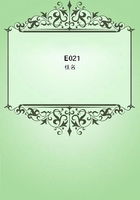
第36章
"I was as a gem concealed; Me my burning ray revealed."
_Koran_
ESSAY V _Love_
Every promise of the soul has innumerable fulfilments; each ofnt. Nature, uncontainable, flowing, forelooking, in the first sentiment of kindness anticipates already a benevolence which shall lose all particular regards in its general light. The introduction to this felicity is in a private and tender relation of one to one, which is the enchantment of human life; which, like a certain divine rage and enthusiasm, seizes on man at one period, and works a revolution in his mind and body; unites him to his race, pledges him to the domestic and civic relations, carries him with new sympathy into nature, enhances the power of the senses, opens the imagination, adds to his character heroic and sacred attributes, establishes marriage, and gives permanence to human society.
The natural association of the sentiment of love with the heyday of the blood seems to require, that in order to portray it in vivid tints, which every youth and maid should confess to be true to their throbbing experience, one must not be too old. The delicious fancies of youth reject the least savour of a mature philosophy, as chilling with age and pedantry their purple bloom. And, therefore, I know I incur the imputation of unnecessary hardness and stoicism from those who compose the Court and Parliament of Love. But from these formidable censors I shall appeal to my seniors. For it is to be considered that this passion of which we speak, though it begin with the young, yet forsakes not the old, or rather suffers no one who is truly its servant to grow old, but makes the aged participators of it, not less than the tender maiden, though in a different and nobler sort. For it is a fire that, kindling its first embers in the narrow nook of a private bosom, caught from a wandering spark out of another private heart, glows and enlarges until it warms and beams upon multitudes of men and women, upon the universal heart of all, and so lights up the whole world and all nature with its generous flames.
It matters not, therefore, whether we attempt to describe the passion at twenty, at thirty, or at eighty years. He who paints it at the first period will lose some of its later, he who paints it at the last, some of its earlier traits. Only it is to be hoped that, by patience and the Muses' aid, we may attain to that inward view of the law, which shall describe a truth ever young and beautiful, so central that it shall commend itself to the eye, at whatever angle beholden.
And the first condition is, that we must leave a too close and lingering adherence to facts, and study the sentiment as it appeared in hope and not in history. For each man sees his own life defaced and disfigured, as the life of man is not, to his imagination. Each man sees over his own experience a certain stain of error, whilst that of other men looks fair and ideal. Let any man go back to those delicious relations which make the beauty of his life, which have given him sincerest instruction and nourishment, he will shrink and moan. Alas! I know not why, but infinite compunctions embitter in mature life the remembrances of budding joy, and cover every beloved name. Every thing is beautiful seen from the point of the intellect, or as truth. But all is sour, if seen as experience. Details are melancholy; the plan is seemly and noble. In the actual world -- the painful kingdom of time and place -- dwell care, and canker, and fear. With thought, with the ideal, is immortal hilarity, the rose of joy. Round it all the Muses sing. But grief cleaves to names, and persons, and the partial interests of to-day and yesterday.
The strong bent of nature is seen in the proportion which this topic of personal relations usurps in the conversation of society.